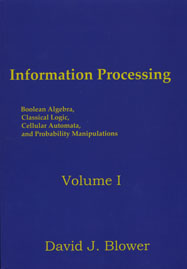|
|

Description
This book begins the task of defining, explaining, arguing for, and, in the end, providing a rationale for information processing. Volume I is concerned with the notion that an information processor is mainly engaged in making inferences. An information processor would prefer to reach definite conclusions by using some form of deduction. Unfortunately, it is often thwarted in this desire by a fundamental lack of relevant information. Probability theory has developed as a rigorous way of dealing with the uncertainty surrounding inference. Thus, we begin by treating some of the formal manipulation rules that crop up in probability theory. To provide some foundational basis for the applications to appear in later Volumes, the topics of Boolean Algebra, Classical Logic, and Cellular Automata will make an appearance here. Several Appendices take on the further task of providing an introduction to Mathematica. This ancillary material supplies us with a universal notion, as well as a means for solving problems that could not be undertaken without the assistance of machine intelligence. Contents Boolean Algebra | Logic Functions | Cellular Automata | Analogies Between Formal Manipulations | Fundamental Rules of Probability | Bayes's Theorem | Generalizing Logic with Probability | Deterministic Cellular Automata | Probabilistic Cellular Automata | Logic Puzzles | Formal Rules for Prediction | Extending the Formal Rules for Prediction | Predicting College Success | Predicting College Success When Data Are Available | What Does Uniformed Mean? | Predicting the Behavior of Cellular Automata? | Introduction to Mathematica through Logic Functions | Boolean Functions and Mathematica | Mathematica Program for Cellular Automata | Proving De Morgan's Axioms with Mathematica | The Mathematica Code Used to Compute the Probability of Future Frequency Counts Related Topics Algebra, Probability and Statistics |
|
|
